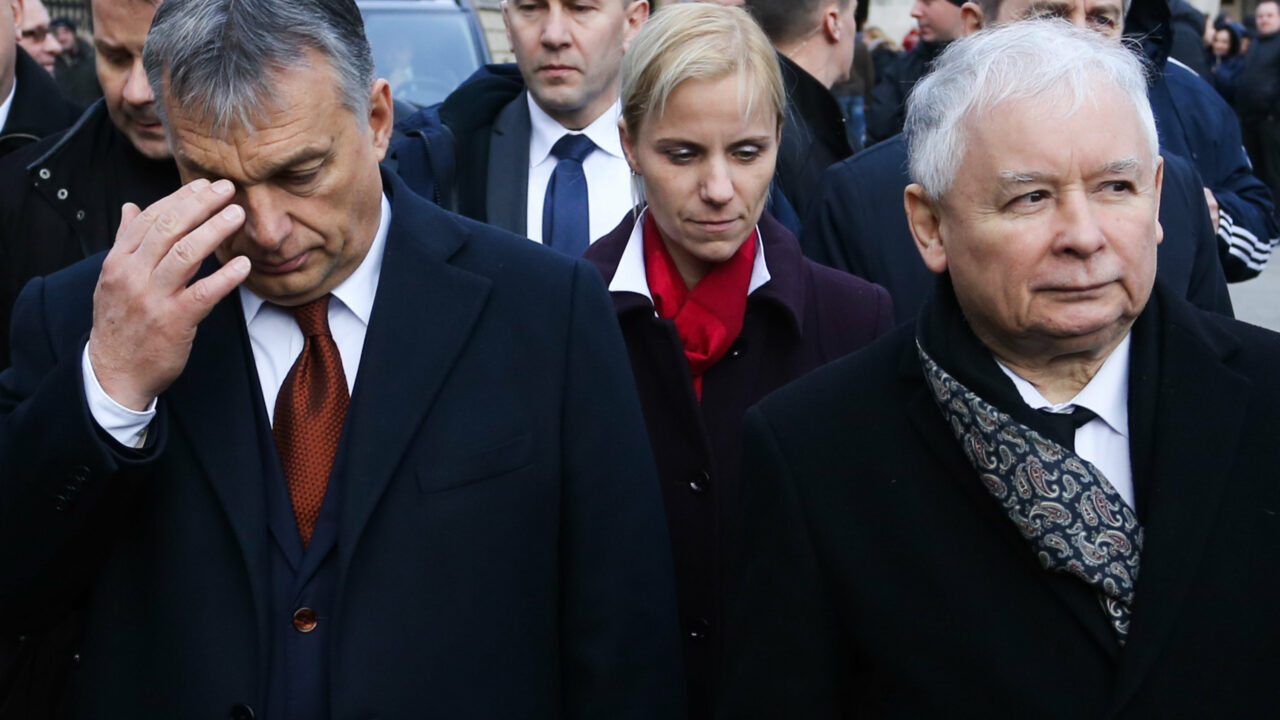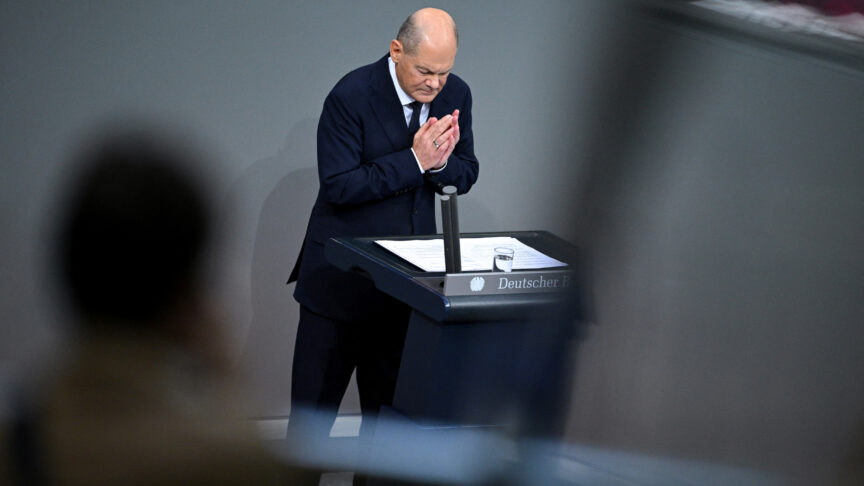The game is not over: Fidesz, Law and Justice, and far-right cooperation in the EU
The war in Ukraine has driven a wedge between Hungary’s Fidesz and Poland’s Law and Justice parties. But they could still mount a powerful challenge to the EU if – or, rather, when – they reunite in their opposition to rule of law demands
In recent years, far-right and nationalist parties across Europe have made increasingly concerted efforts to cooperate with one another. Together, the Fidesz party in Hungary and the Law and Justice party in Poland were a driving force behind this movement. But Russia’s war against Ukraine has caused their relations to deteriorate: Poland quickly emerged as one of the Kremlin’s staunchest critics, while Hungary’s government is now the most pro-Russian in the European Union. Despite that, their relationship is surviving due to their shared commitment to dismantling the rule of law. And both parties are still interested in unifying the far-right and nationalist right across the continent to challenge the EU mainstream.
The Hungarian prime minister, Viktor Orban, is something of a pinup for European nationalist and far-right politicians. He and his Fidesz party have ruled Hungary for 12 years, sweeping to victory yet again in this April’s parliamentary election. Over the past decade, his domestic policies have brought Hungary the dubious honour of becoming the only “partly free” country in the EU. Moreover, as long ago as 2011, the leader of Law and Justice, Jaroslaw Kaczynski, argued that success for his party would be to emulate Orban’s Hungary. Since gaining power in 2015, the Polish party has enthusiastically followed Fidesz in undermining the rule of law. In contrast to Orban’s constitutional majorities, Law and Justice only narrowly won the last election – which has tempered the extent of democratic backsliding in Poland.
Orban’s and Kaczynski’s domestic policies have prompted unprecedented conflict between Poland and Hungary, on the one hand, and the EU, on the other, over breaches of the rule of law in both countries. Hungary has become the first country against which the European Commission launched its rule of law conditionality mechanism. Meanwhile, neither country’s recovery and resilience plan has received the commission’s endorsement due to their governments’ disregard for the rule of law.
Fidesz has not only seen a deterioration of relations with EU institutions, but also with its long-term political family, the centre-right European People’s Party (EPP). In 2021, Fidesz split from the EPP and remains unaffiliated. Orban has since launched attempts to reorganise the European far-right, seeking to bring together parties of the right-wing European Conservatives and Reformists group (led by Law and Justice, and which includes Spain’s Vox party and the Brothers of Italy) and the radical-right Identity and Democracy group (led by Italy’s League, and which includes France’s National Rally). His goal has been to increase their collective weight at the European level. Law and Justice was until recently also open to attempts to unite these Eurosceptic and far-right parties, even though most of them hold pro-Russian sentiments. Indeed, a first summit attempting to facilitate this took place in Warsaw only recently, in December 2021. At that meeting, a dozen parties – including Fidesz and the National Rally – discussed closer cooperation and voting alignment in the European Parliament to pursue the sovereignty of member states and promote their shared views on issues such as migration.
Russia’s invasion of Ukraine has since thrown a spanner in the works. Hungary’s half-hearted support for EU sanctions on Russia and Orban’s vocal objection to an oil embargo are straining relations between Fidesz and Law and Justice. Even so, Kaczynski’s criticism of Orban’s position on Russia was initially mild compared to the condemnation Law and Justice meted out to Germany. Kaczynski preferred instead to stress that Hungary had never let Poland down within the EU. In a similar vein, and to deflect from the tension between the two parties on Russia, Orban stated at the first international press conference following his election victory that Hungarian-Polish cooperation works best in pursuit of shared interests within the EU – a remark which sheds light on their shared values. Orban added that this joint effort has continued unharmed. However, his reluctance to clearly condemn Russian atrocities in Bucha at the same press conference prompted stronger censure from Kaczynski, who criticised Orban for his stance, stating: “we cannot continue to cooperate [with Fidesz] as we have so far if it continues like this.”
For Fidesz, coordination and even a potential alliance with other radical-right partners cannot compensate for the benefits of strong ties with Law and Justice
As if to emphasise this cooling of relations, Orban’s first official visit after his re-election was not to Warsaw, as had become his tradition. Instead, in a surprising move, he went to the Vatican. He then met League leader Matteo Salvini in Rome, where the two reiterated their intention to work towards the unification of the European far-right (or, as they termed it, the “centre-right”). Meanwhile, since the Russian invasion, Law and Justice has ceased to engage with pro-Russian far-right politicians from western Europe – although during the recent French presidential campaign, the Polish prime minister, Mateusz Morawiecki, was scathing about Emmanuel Macron yet refrained from criticising National Rally’s Marine Le Pen.
The two parties are unlikely to drift apart completely. Fidesz is set to strengthen its authoritarian course after its electoral success. And due to the war in Ukraine and the ‘rally round the flag’ effect, Law and Justice is entrenching its lead in the polls. Nevertheless, democratic backsliding in Poland will likely remain much softer than in Hungary, given that Law and Justice does not hold a constitutional majority. Following the Polish parliamentary election next year, it will likely need to form a coalition to govern, or, at most, will win only a modest majority.
Poland and Hungary will still need each other as mutual guarantors in the face of criticism from EU institutions and other member states concerning the rule of law. However, if Hungary does not take a tougher stance on Russia, Warsaw will not reconcile with Budapest and cooperation will remain limited to this basic common denominator. For Fidesz, coordination and even a potential alliance with other radical-right partners cannot compensate for the benefits of strong ties with Law and Justice. Orban will thus try to mend fences with Kaczynski, as illustrated by the first official visit of the newly elected Hungarian president and member of Fidesz, Katalin Novak, to Warsaw – where she condemned Russia’s aggression.
In the coming years, the scale of cooperation between Fidesz and Law and Justice will to a large degree shape the unification efforts of the Eurosceptic far-right within the EU. The war in Ukraine will be another important factor. If the war ends or becomes a low-intensity conflict in the coming months, the EU should prepare itself for renewed vigour from the far-right and nationalist right in their attempts to coordinate. Moreover, Russia’s aggression in Ukraine has highlighted the need for united EU action, which could accelerate the deepening of EU integration. This in turn could provoke the far-right and nationalist right – whose proponents have long promoted a reversal of EU integration – to band together and advocate a return to a Europe of nation states.
The European Council on Foreign Relations does not take collective positions. ECFR publications only represent the views of their individual authors.



